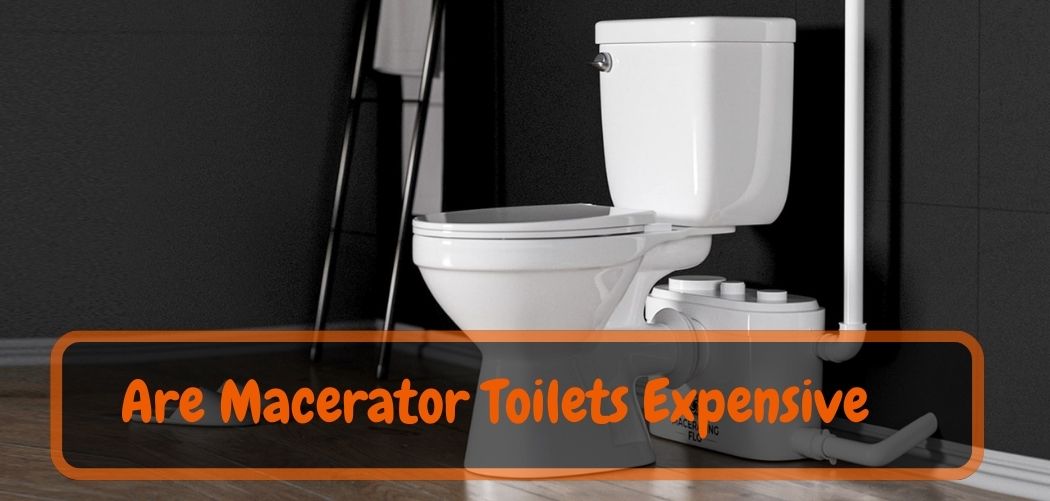Macerator toilets can be expensive, depending on the features, quality, and brand. With their powerful grinding system, these toilets are a cost-effective solution for homes with specific plumbing needs.
When it comes to modern plumbing solutions, macerator toilets have emerged as an intriguing option, especially in scenarios where conventional plumbing setups may not be feasible. Macerator toilets are known for their space-saving design and ability to pump waste through small-diameter pipes.
However, one question that frequently arises among potential users is, “Are macerator toilets expensive?” Delving into this inquiry requires an understanding of the cost considerations associated with acquiring, installing, and maintaining macerator toilets.
As well as evaluating their overall value proposition. In this exploration, we will analyze the factors that contribute to the cost of macerator toilets and weigh them against the benefits they offer, aiming to provide clarity for those considering this innovative sanitation solutio
Macerator Toilets: A Revolutionary Solution For Modern Plumbings
Macerator toilets offer a revolutionary solution for modern plumbing. Toilets have come a long way through the years, and macerator toilets are certainly a prime example. They work by grinding waste from the bowl and pumping it through pipes.
When compared to traditional toilets, macerator toilets have a host of benefits. They use less water and take up less space, making them suitable for smaller bathrooms. You might be wondering now if macerator toilets are expensive.
While they do come at a higher cost than traditional models, it’s worth considering the benefits they offer. Ultimately, macerator toilets are a smart investment in the long run for both your convenience and environment.
A Comprehensive Guide: Are Macerator Toilets Expensive?
Macerator toilets, also known as upflush toilets, are innovative plumbing fixtures designed to handle wastewater in locations where traditional plumbing systems are impractical or too costly to install. They utilize a macerator pump to break down waste and toilet paper into a slurry,
Which is then pumped through small-diameter pipes to the existing plumbing system. While these toilets offer several benefits, an important consideration for potential users is their cost.
In this comprehensive guide, we’ll delve into various factors that contribute to the expense of macerator toilets and help you understand whether they fit within your budget.
1. Initial Purchase Cost:
The initial purchase cost of a macerator toilet typically includes the toilet unit itself, the macerator pump, and any necessary accessories. Macerator toilets are generally more expensive than traditional gravity-based toilets due to their specialized design and pump mechanism.
The cost can vary based on the brand, model, features, and overall quality. Higher-end models with advanced features like quieter operation, more powerful pumps, and sleek designs may come at a premium.
2. Installation Expenses:
Installing a macerator toilet involves both the cost of the toilet itself and the installation process. Installation costs may include hiring a professional plumber or contractor to set up the toilet, connect the macerator pump, and integrate it with the existing plumbing system.
The complexity of the installation, location of the installation, and accessibility of plumbing connections can all impact the installation costs.
3. Maintenance and Repairs:
Macerator toilets require regular maintenance to ensure their proper functioning. This can involve tasks such as cleaning the macerator pump, checking for any blockages, and ensuring all components are in good working order.
Additionally, in case of any malfunctions or breakdowns, repairs may be necessary, which can incur further costs for replacement parts and professional services.
4. Operational Costs:
While not a significant ongoing expense, it’s worth considering the operational costs associated with using a macerator toilet. This may include the electricity needed to power the macerator pump. However, this cost is typically minimal in the context of overall household energy usage.
5. Long-Term Savings and Value Proposition:
When evaluating whether a macerator toilet is expensive, it’s important to consider the long-term savings and value it provides. Macerator toilets can be cost-effective in certain situations, especially where installing traditional plumbing is impractical or costly.
They can save on construction expenses, as they often require less extensive plumbing alterations. Additionally, their ability to pump waste vertically or horizontally can make them a valuable solution for basements, additions, or areas distant from the main sewer line.
6. Considerations for Cost-Effectiveness:
To maximize cost-effectiveness, consider factors such as your specific plumbing needs, the location of installation, the availability of existing plumbing connections, and the overall budget you have allocated for your toilet solution.
Assess the benefits and drawbacks of a macerator toilet in relation to your unique circumstances to determine if the investment aligns with your long-term objectives.
Also Read: Are Macerator Toilets Any Good: The Ultimate Guide!
Also Read: Why is Macerator Toilets are Blocked: Easy Guide to Know!
Also Read: Silent or Screechy: Are Macerator Toilets Noisy?
Also Read: Downsides of a Tankless Toilet: Beware Before You Buy!
Also Read: The Ugly Truth: Disadvantages of Macerator Toilets
The Advantages And Disadvantages Of Macerator Toilets
Macerator toilets are a cost-effective solution for space-limited bathrooms. Their versatile design allows for installation where traditional toilets can’t be used. The flushing mechanism is efficient and saves water but can be noisy.
However, the noise can be addressed by installing soundproof materials. Maintenance and repair costs can be high, but with proper care, the toilets can last a long time. Macerator toilets are not suitable for all types of buildings and facilities due to their design limitations.
Despite this, they are ideal for below sewer line installations. Overall, the benefits of macerator toilets outweigh the drawbacks, making them a viable option for many homeowners and businesses.
Frequently Asked Questions Of Are Macerator Toilets Expensive?
How Does A Macerator Toilet Work?
A macerator toilet grinds waste and uses a pump to push it through small pipes.
Is Installation Of A Macerator Toilet Complex?
Macerator toilets are relatively easy to install, and you can do it yourself.
Are Macerator Toilets Noisy?
Macerator toilets can be noisy, but advancements in technology have reduced the noise significantly.
Can Macerator Toilets Handle Large Volumes Of Waste?
Macerator toilets can handle human waste and toilet paper, but anything else can cause blockages.
Are Macerator Toilets Expensive To Maintain?
Macerator toilets are generally not expensive to maintain, but breakdowns can be costly. Regular maintenance is advisable.
Conclusion
The cost of macerator toilets is influenced by various factors such as the initial purchase price, installation expenses, ongoing maintenance, and potential long-term savings. While macerator toilets may have a higher upfront cost compared to traditional toilets,
They can offer significant advantages in terms of space utilization, flexibility in plumbing installations, and potential savings in construction or retrofitting. It’s essential for individuals considering macerator toilets to weigh these costs against.
The benefits they bring to determine if the investment aligns with their specific needs and preferences. Ultimately, the decision on whether macerator toilets are expensive depends on a careful assessment of both short-term expenses and long-term value.

